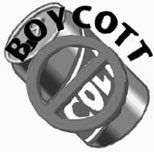 DUBAI, United Arab Emirates (IPS)�The university cafeteria at
the University of Sharjah has stopped selling soft drinks manufactured
by U.S. multinationals, and instead stocks other beverages produced in
the country or region.
DUBAI, United Arab Emirates (IPS)�The university cafeteria at
the University of Sharjah has stopped selling soft drinks manufactured
by U.S. multinationals, and instead stocks other beverages produced in
the country or region.
The American economy is "surviving on Arab money, which is used to
supply the Israelis with monetary and military assistance to kill the
Palestinians who are resisting the occupation for 50 years," Nawal Jasim,
head of the Women Students� Union at the university, said in explaining
the boycott.
"If the Arab governments do not boycott American goods, we believe it
is our responsibility to take the initiative," Ms. Jasim added. "We are
a billion Muslims and imagine how much the U.S. economy would be
affected if each of us boycott a soft drink or all American products."
These moves for a boycott, amid the Israeli offensive against
Palestinian areas, are triggering a people�s revolution of a kind rarely
seen before in the region. They reflect how the angry political calls in
the Arab streets for Israel�s withdrawal are fast turning into a search
for an economic threat against Washington, in order to force a policy
shift by the United States.
Unlike the rhetoric of Arab governments, people in the region are
resorting to taking action at their level by boycotting U.S.-made
products�thus, UAE journalists are organizing a boycott conference, some
Lebanese have begun turning their backs away from American products like
cigarettes. Some have gone as far as calling for a repudiation of the
U.S. dollar in international trade.
"I have never seen the streets in the Gulf filled with so much hatred
and anger as they have been in the past fortnight. The situation is
reaching boiling point," said Dr. Saeed Hareb, professor of law at the
UAE University. "The striking feature of the demonstrations is that the
initiatives have been taken not by the governments, but by students as a
collective group and by individuals out of their own choice."
Recently, the UAE Journalists� Association announced that a national
committee for boycotting American goods would be formed in cooperation
with public welfare societies and civil society organizations.
In a statement, Dr. Aisha al-Nuaimi, a member of the association,
urged the government to support the first boycott conference on May
13-14.
Anas Al Zaibaq, a Syrian marketing representative working for a
private company in the UAE, said: "Since the United States has been
supporting Israel in its crime, we as Arabs must put pressure on it by
boycotting its products."
A war on the economic front is one language the materialistic West
understands, he argues.
The first of the demands for the boycott of American products in the
region came surprisingly from Bahrain, a major non-North Atlantic Treaty
Organization (NATO) ally of the United States and where its navy�s Fifth
Fleet is now positioned. Anti-Israel and anti-U.S. graffiti reportedly
began appearing there several weeks ago.
So far, the rallying calls have not just been for boycotting American
goods, but "we want the government to close the U.S. embassy and the
military bases," according to Akhbar Al Khaleej newspaper.
A group of people even managed to break through a U.S. embassy
compound wall, damaging windowpanes and setting at least three cars on
fire, leading King Hamad Bin Issa Al Khalifa to warn Washington that the
U.S. interests in the region were in jeopardy if it did not alter its
Middle East stance.
Apart from the Gulf, Lebanon, Morocco and Iraq have also witnessed
"boycott" calls.
American cigarettes became the first casualty of such calls in
Lebanon. "The price of a packet of American cigarettes is equal to the
price of a bullet that will be targeted at the Palestinian people," said
a leaflet distributed by university students in Beirut recently,
according to the local Gulf News newspaper.
Lists of Lebanese, Arab, European and Asian products have been
distributed to houses as alternatives, resulting in the "sale of
American cigarettes going down by half," it added.

![]()